 What does it mean when an author puts “No 1 bestselling author” or “No 1 bestselling book” in their social media profile? That is a hard question to answer. Were they, even for a short time, the bestselling author in the world? That’s hard to say unless you search the bestsellers listings on a regular basis. Maybe they were, maybe they weren’t. Were they the bestselling author in their country? Same answer. Were they the bestselling author in their genre? Same answer. You see the problem we have here. They may be telling the truth, they may be telling a lie, or they may be telling the truth, but not the whole truth. 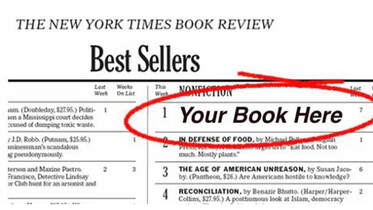 I’m referring here to the Amazon bestsellers lists, because the newspaper and literary magazine listings have very strict criteria for getting onto their lists. They are based on global or national sales for the week, month or year and the figures are provided by the retail outlets, not by the publishers or authors. That makes it more difficult for the figures to be inflated (ie lied about). For the Sunday Times or Guardian bestsellers lists for the year, for example, you would need to sell in the region of a 100,000 copies of your book in all formats just to get into 100th place. If you ever make the dizzy heights of being No 1 on those lists, no one will doubt your right to call yourself “bestselling”.. For a start, lots of readers will have heard of your name and the title of your book by then, because you will have been all over the retail outlets, both the physical shops and on-line. 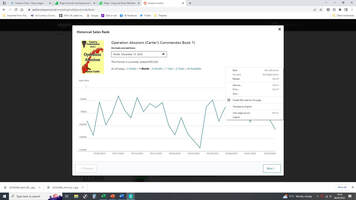 But on Amazon, for some sub-genres, you could get to No 1 spot with just a single sale. Even to get to the No 1 slot in one of the top level genres, you could make it with just a few hundred sales. We used Publisher Rocket’s “category search” function and discovered that in the Books>Science Fiction and Fantasy category you can make the No 1 slot with only 335 copies sold. You would have to sell them over a short space of time, no more than a day probably, but that is doable if the book is a good one. OK, that may only be for a few hours, or for a few days, but you’re up there and you can screenshot it to provide evidence of your claim. Which is where telling the truth, but not the whole truth, comes into the equation.  An author can claim to be No 1, but they don’t have to say for how long they were No1, or in what category and/or sub-category they were in. Because, on Amazon, you can choose your own categories and Amazon won’t question it. You can list your book as Kindle Store > Books > Science Fiction & Fantasy > Fantasy > Christian Fantasy. You can then ask 5 family members or friends to buy a copy of your own book (you might even give the money so they don’t have to pay for it themselves) to send it to No 1 in that category, where it will stay until another book in the same category outsells it. Amazon won’t question that choice of category, so it won’t get rejected. And you don’t have to tell your followers on social media that you have only sold five copies when you put “No 1 bestselling author” (or book) in your profile.  Am I advising you, as a self-published author, to game the system by listing your books in obscure categories where you can make the No 1 slot with just one sale? No, I’m not. What I am advising you, as a reader, to beware of is that just because someone has made the claim, it doesn’t mean their book is actually a best seller in any real meaning of the expression, because the author may have gamed the system. We live in a world where deception is now seen as normal because people use the excuse “everyone does it”. Well, I’m here to tell you that not everyone does it, because we here at Selfishgenie Publishing don’t do it and we don’t allow our authors to do it either. It means that we will probably never be able to claim “best seller” status for any of our books, because although we sell quite a few books, we don’t sell 100,000 copies a year of any title. What can you do as a reader to make sure you aren’t fooled?  The answer is not to look at subgenres when looking at the sales rankings. Look only at the overall ranking and then the headline genre eg. Sci-fi and fantasy; thrillers, crime; Action & Adventure, Romance, etc. If a book is ranked overall in excess of 500,000 (10k in its genre) then it means it hasn’t sold very many copies and probably not sold any recently. If a book is between 500k and 100k (10k to 5k in its genre) it has sold a few copies and probably in recent months. If a book is between 100k and 50k ( 5k to 2k in its genre) it is selling more copies, and if it is better than 50k it is selling regularly. If a book is ranked better than 10k (2k in its genre) then it’s doing very well. And if it’s doing very well, there is probably a good reason for that which has nothing to do with the author’s claims for it. In other words, you can buy with some confidence that it is likely to be a good read. 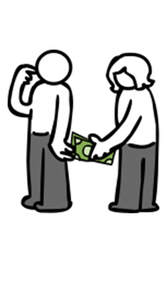 Those numbers are just “ballpark” though. Because sales vary so much between genres, it is difficult to be too precise. It’s like comparing apples to elephants. A high volume genre such as Action & Adventure is going to require more sales to get it to the 10k ranking than a book in a lower volume genre, such as Horror. That is why the overall ranking and the genre ranking have to be viewed side by side. And that’s why looking at sub-genres can be so misleading. As I have pointed out, in some categories it is possible to be No 1 with just a few sales. If the author has a loving mother, father, spouse, siblings and few good friends to buy the book, it could get a pretty good sales ranking even if it is the worst book ever written. If you have enjoyed this blog, or found it informative, then make sure you don’t miss future editions. Just click on the button below to sign up for our newsletter. We’ll even send you a free ebook for doing so.
0 Comments
 Here at Selfishgenie we try not to mention politics or religion in our blogs. It’s not that we don’t have opinions on those subjects – we’re human (honest, we are) so of course we have opinions. No, it’s that if we express our opinions we are pretty sure that we will alienate a considerable number of our readers. It doesn’t matter which side of the discussion we are on, we are going to alienate the people who are on the other side. And that is bad for business. If we alienate people, they may decide that they want to punish us for our views by not buying the books we publish.  Are you opening a can of worms? Are you opening a can of worms? If they do that, however, they aren’t just punishing us, they punish our authors and that’s wrong, because those others don’t necessarily share our views. In fact, I know of a couple of our authors that have opposing views, but we manage to get along amicably anyway. So, the people that are trying to punish us actually end up punishing people who agree with them. It’s a strange world, isn’t it? But, of course, that brings into question how Indie authors handle politics and religion, and it can be very bad for sales. I include in this views on climate change, race, homosexuality, transexuals, conspiracy theories, vaxxing, and a wide range of other issues which have political or religious implications. 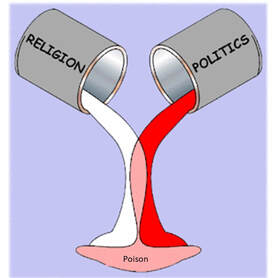 A poisonous mixture! A poisonous mixture! Every time we post something on social media, it tells the world a little bit about us. And some of the things we say have the power to alienate people. It doesn’t matter that they are our sincerely held beliefs. It doesn’t even matter that what we say may be true. All that matters really is that it has the power to affect book sales. I know there are authors who struggle with this. They have strong beliefs and they want to express them either to support or oppose whatever it is their beliefs are about.  But some of the people who take an opposing view read those Tweets and think ‘I don’t agree with them, therefore I won’t enjoy their books if I bought them, so I won’t buy them’. It may be an absurd view, but that doesn’t stop people taking it. I once overheard someone say that if they had known that a certain author held certain political views, they would never have bought their books. The person they were talking to asked them if they had actually enjoyed the books, to which the first person replied that they had. You see how ironic that is? Even though they had enjoyed the books, they wouldn’t have bought them if they’d known the political views of the author. Absurdity in the extreme. But I’m pretty sure that person isn’t an isolated example. 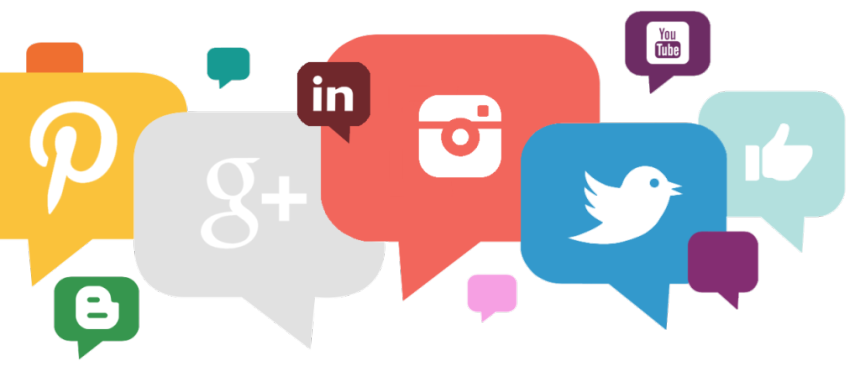 Then there are the political “discussions” people get embroiled in. Some of them get quite heated; insults get thrown around and generally the people involved never come out of it looking good, no matter how valid their arguments. Again, if one of the participants is an author, it won’t help their brand image. No one knows how many people are viewing those social media arguments and taking note of what is being said, so the people involved never know how much harm they are doing to their “brand”. And, of course, it is there forever. Even if it is deleted by one of the parties, it can still be found on a server somewhere.  Some people would rather burn books than read them - even yours. Some people would rather burn books than read them - even yours. The other side of this coin is the expression of political or religious views in books. There are times when that is appropriate for those to be featured in novels, of course, but there are times when it isn’t. It is possible for some books to use sensitive subjects and become bestsellers, such as “To Kill A Mockingbird” and “Last Exit To Brooklyn”. However, it isn’t possible to know in advance how books featuring these topics will be received and for every Booker/Pulitzer prize winning bestseller there are a thousand books that sink like lead balloons. 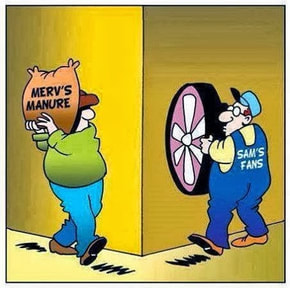 If you are writing books aimed at a specific audience who are likely to share your views, then writing about religion or politics (or the rest) is perfectly OK. You aren’t going to alienate people who agree with you and it doesn’t matter if everyone else is alienated because you don’t expect them to buy your books. And you will soon find out how many people support your views from the number of sales you make. But if an author is trying to find a broad audience who have a wide range of views on politics and religion, including sensitive topics in novels has the power to make the reader throw their book at the wall and you can be sure they’ll never buy another one by the same author. So, there are two different bear traps to consider when you are writing your book.  If you are a big name author you can probably ride out the storm created by expressing your views in public. I could list a dozen authors who have created social media storms on a range of issues and their careers haven’t suffered. However, I know of one big name who can't now get a job cleaning sewers because no one will employ him anymore. He’s an actor. He made his political views public and it has ruined his acting career. Can you, as an Indie author, take that risk? Your career could be over before you’ve even sold your first book. Not only that, but everything you say on social media remains there forever, somewhere, lurking and waiting to be exposed by someone with an axe to grind. When you are better known, as we all hope to be, it can also come back to haunt you. Even if you have modified your views over the years and you no longer believe as you did back in the day, no one will believe you. After all, we all know that leopards can’t change their spots, don’t we? 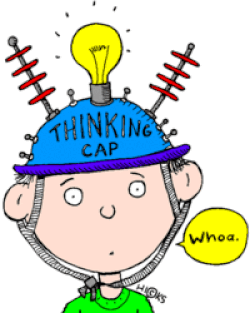 Of course, people can (and do) change, but the people who are out to embarrass you will assert that you haven’t changed, and other people will listen to them because it will be hard for you to prove that you have changed. The only way you will be able to restore your reputation will be to hire a very expensive PR agency to give your public image a make-over and nobody wants to have to spend that sort of money. As I said, it doesn’t matter which side of the argument you are on, the people on the other side of it will either stop buying your books or, worse, will try to take you down for having the temerity to express your opinions. Of course, there are times when you can introduce politics into novels with broad appeal. For example, in novels set during the 1930s and 40s, making your protagonist an anti-fascist is fine. Similarly, for books set during the Cold War it would be OK for them to be anti-communist. But those are areas where there is broad agreement that the relevant regimes were evil. They are the exception, not the rule. And if there are readers who think those regimes weren’t evil, you probably aren’t too bothered about alienating them. 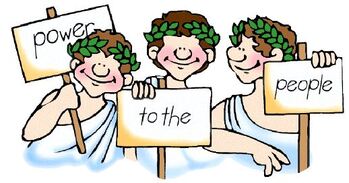 In political thrillers it may seem obvious to align your characters to a political party, but that way lies madness. No matter on which side you place them, someone is going to take offence, especially if it is hinted that everyone who supports a similar political line is tarred with the same brush. Make a politician corrupt or venal and suggest that they belong to party X and not to party Y, and you are bound to upset all the supporters of party X. That could be up to 50% of the reading public in some countries. Making religious figures corrupt or evil is just as bad. 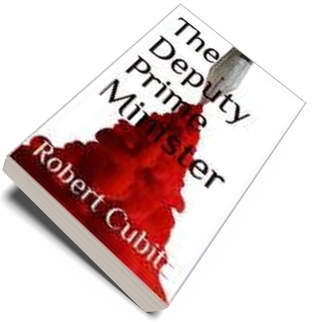 One of our authors wrote a political thriller and left the actual politics ambiguous. After all, personal greed and ambition are not limited to one party or another, because it is the individual that is greedy or ambitious. A study of scandals relating to the conduct of individual politicians will reveal that no party ever comes out of things squeaky clean. (We’re not going to name names, for the reason with which we started this blog). So, when it comes to politics, religion and other topics where people are divided, if you decide to dabble, either on social media or in your books, take care because you are entering shark infested waters. And if you feel you really must nail your colours to the mast on social media, write under a pen name so no one knows who you really are, or use a fake name on social media. If you have enjoyed this blog, or found it informative, then make sure you don’t miss future editions. Just click on the button below to sign up for our newsletter. We’ll even send you a free ebook for doing so.  Timing is everything in life, but even more so for Indie authors who are trying to promote their books on a limited (or even zero) budget. Here at Selfishgenie we track our sales on a day by day, week by week, month by month basis so that we can work out when is the best time to advertise our books. Some days we see more people buying books than on other days, so they are the days we want to advertise, so that we can catch the readers' attention on the days when they are buying. That doesn’t mean to say we don’t advertise books on other days. After all, people are all unique and each person has their own shopping habits. But we know that, in broad terms, there are days when more people buy books than other days. Those are the days when we may consider increasing our advertising spend. I’ll go into why those variations exist in a moment.  By tracking people’s book purchasing habits over a longer period of time we can also work out when to do promotions. Again, I’ll go into why that may be in a moment. But that same timing issue extends to when we should launch our books. There are some months of the year when it is better to launch a book than others. I’ll be talking about the UK here, but the same rules probably apply wherever you live. All you have to do is adjust to suit your calendar. June and early July are a good time to launch a book in the UK. Why?  Because the majority of people take their vacations in July and August and will be looking for something to read while they hang around in airports, sit in their aircraft seats for several hours and then lounge around the swimming pool at their destinations. For some people this may be the only time of the year when they actually have time to read a book. This is particularly relevant for the ebook market, because no one ever takes enough books with them on holiday, so they’ll be logging their Kindles into the hotel Wi-Fi to buy even more books for the second half of their holiday and for the return journey.  Children's books - yes for July, no for January. Children's books - yes for July, no for January. Children’s books are especially popular at that time of year, because parents are desperate to keep their children occupied while travelling and during the school holidays. The first quarter of the year, on the other hand, is very bad for children’s books because (a) they are back at school, (b) they still haven’t read all the books they received from loving relatives at Christmas and (c) money is tight during the first quarter (see more below). If your books are aimed at the older reader, you will probably want to launch your book in August, because all those grandparents who have been on child minding duty over the long summer holiday period are suddenly free to go on holiday themselves in September, when the kids go back to school. I know, because that’s when I go on holiday and the hotels I go to appear more like old folks’ homes than holiday resorts. There are very few people there who are under fifty and those that are there either have no children or have children who are still too young for school. 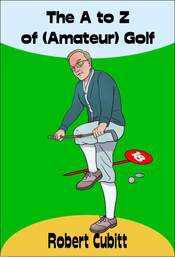 Here’s a tip for you, if you write books in a series. Take a paperback copy of Book 1 with you when you go on holiday and leave it in the hotel (most hotels have a shelf of books for people to borrow). You may snag a new reader for the rest of the series that way. Obviously the seasonal issues mentioned above are applicable to advertising spend as well as book launches. In November and right up to mid-December 2022 we promoted our golf book as a Christmas present for golfers and made quite a few sales that way – more than the whole of the rest of 2022 put together. If you want to know more about the best time to launch your books, broken down into genres, we found this helpful article. But there are others if you do a search. So, what is the best time to advertise?  Books are a popular Christmas present, so giving your advertising a seasonal boost may pay dividends and, of course, we’ve already mentioned the summer season. Think about advertising romance in the run up to Valentine’s Day and promote books as a gift for Mothers’ Day and Fathers’ Day But what about routine, week-in-week-out advertising activity? We found Friday to be the best day of the week to advertise, as that is when people go to look for their weekend reading. Weekdays are generally “early to bed days”, both for children and adults, but at the weekend a lot of people catch up on their reading and to do that they need books. Hence higher sales figures for books on a Friday.  You can even refine that down a little bit if you want. Come lunchtime everyone is thinking about finishing for the week, so they may start browsing the book listings from lunchtime onwards, so you don’t need to spend so much money in the morning. Sunday evening is also a good time, especially for paperbacks. Come Sunday evening a lot of people have either finished their books or are getting close to finishing. The “forward planners” will be thinking ahead and looking towards the following weekend. Paperback readers will be ordering on Sunday evening so that their books are with them by Friday. At the other end of the scale we have noticed we get far fewer sales on a Saturday and a Monday. Saturday is probably slow because people have a lot of family things going on as well as shopping, sport and general leisure activities. Monday probably because people are back at work and won’t have much time to think about reading.  Certain times of the year are better than others for promotions. January and February* are the months when the Christmas chickens come home to roost and those credit card bills for all the holiday spending land on the mat. Energy bills are also at their highest. This means people have less money to spend and one of the places they can cut back is on their book purchases. We have seen consistent reductions in income during the first two months of the year since we started our business. So, this is a great time to do a price reduction or free book promo – especially free! Everyone can afford to buy a book that is free! Again, I’m talking to the series writers mainly. Give the first book in the series away at a reduced price, or for free, and there’s a good chance that if the readers like it, they’ll come back for the rest of the series -at the normal price - when they have a bit of disposable income in their pockets once more.  This is where you have to manage your marketing activity very carefully. No one can download a free book unless they know it is available. So, you have to be prepared to do some marketing. Social media marketing is free of course, but evidence suggests it is becoming less and less effective as a marketing channel.  Conversely, Amazon Ads, Facebook Ads, Google Ads etc are quite expensive, and you don’t want to spend a lot of money to give something away for free, even if you are going to get the money back later in sales for Book 2 onward. There is a happy medium and this is where book promotion sites come in. This year we used Book Reader Magazine and found them to be both cheap and effective. We are NOT recommending them and there are plenty of other, similar, sites who do the same job. You’ll find a list of some of them here. That site also offers some promo codes so you can reduce the cost. Book Reader Magazine cost us $15 (approx (£13) when we used a promo code and we got plenty of downloads as a result.  What was the outcome (because that is what is important)? During the first week of March we saw a massive surge in sales of the series we gave away. Some of that increase may have come about because people had a bit more cash available, but the majority of it is likely to be because they had downloaded Book 1 for free and wanted more of the same. It’s an 8 book series (so far) and we make a profit of about £3.50 per book. So, snagging one new reader that way not only repaid our investment, it gave us about an 80% profit.  I can assure you we snagged way more than one new reader. Regardless of the season you will need to continue with your advertising at other times if your books are listed on KindleUnlimited (KU). As it’s a subscription service, readers want to get value for money from it and you want the books they download to be your books, so you have to keep pitching to them. You can expect to see KENP page reads going up during January and February as readers opt not to buy books if they are already KU subscribers. Most mainstream publishers don’t use KU, so this is a great opportunity for Indie authors to get their books read instead. However, you may want to reduce your advertising spend a little to reflect the reductions you’re going to get in ebook and paperback sales during the same period.  At this point I have to add a “health warning”. The results I’ve talked about above relate to the books we sell. You may want to analyse the sales data for your books to see if they conform to that pattern – or if they are different. We suspect that there will be similarities, but we can’t guarantee it. * Traditionally January and February were known by London taxi drivers as the “kipper season”. Kippers (a type of smoked herring) used to be a cheap food and taxi drivers ate a lot of them when their income was reduced during the first two months of the year. Presumably they would call it “pot noodle” season now. If you have enjoyed this blog, or found it informative, then make sure you don’t miss future editions. Just click on the button below to sign up for our newsletter. We’ll even send you a free ebook for doing so.  In last week’s blog we discussed marketing for the Indie author and, in particular, constructing a marketing plan. The blog was getting pretty long, so I didn’t say all I wanted to say at that time. What I did say was that the content of your plan lay in the old Rudyard Kipling quote “I keep six honest serving men (they taught me all I knew); Theirs names are What and Why and When and How and Where and Who.” Putting those words into questions helps you to decide the content of your plan: what you will say, who you will say it to, when you will say it etc. That is all good, but some people have never constructed any sort of plan at all, so this blog is aimed at them. How do you get from that Kipling quote to selling more books? For those of you who have written so many plans it is you who should be writing this blog, please feel free to tune out. Maybe go and browse our catalogue, which can be found on the ‘Books’ tab of this website. For everyone else, are you sitting comfortably? Then I shall begin.  The first thing you need when creating a plan is an objective, goal or desired outcome. Call it what you like, but it is a description of where you want to be by the time your plan has been delivered. For Indie authors this is usually quite simple to define – your goal is probably to sell more books. You even have a readymade measurement there to tell you if the plan is working – the number of books that you are selling after you have delivered the plan compared to the number you are selling now. But that is a big goal to achieve and you will need to do a lot of work to achieve it. What you also need to know is if your plan is taking you in the right direction. It might take you 3 months or more to achieve your goal and that is a long time to wait to find out that your plan isn’t working and needs to be re-thought. 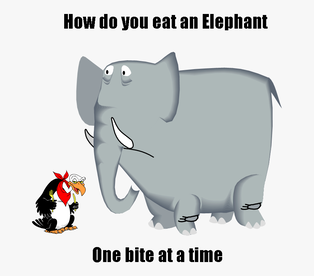 So you have to create sub-objectives, which you can tick off along the way to make sure you are staying on track for success. Believe me, if each step is successful, then the final outcome can never be in doubt. And if some of the sub-objectives still seem quite daunting, you can break them down even further. Remember the old maxim: “How do you eat and elephant? – One bit at a time.” (apologies to vegans). You may even want to run a few “pilot schemes” or “trials” to see if what you plan to do is actually going to work on a larger scale when you set the whole plan in motion and those trials also become sub-objectives.  Build the walls before you try to put on the roof. Build the walls before you try to put on the roof. One of the things of which you have to be careful, is that you lay out your sub-objectives in the right order. For example, if you were building a house, “Put the roof on” wouldn’t appear in the plans until after “dig foundations” and “build walls”. You may need to spend a bit of time making sure your marketing plan is constructed in the right order, just like you would build a house.  Last week we talked about getting some training in social media marketing, so that might be an early sub-objective in your plan. We also talked about writing your marketing messages, so trying those out on people might be another sub-objective. But basically, all you are doing is breaking down one very big and daunting objective into several smaller, less daunting tasks, then laying them out in a logical order. In project management we call the completion of sub-objectives or tasks “achieving a milestone” and it feels very rewarding to reach each milestone and tick it off your plan. But, just like real milestones, you have to know where they are, which means having some sort of measurement of achievement for each task. 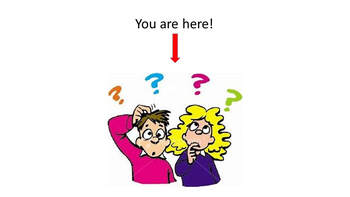 After all, there is no point in knowing “you are here” if you have no idea what “here” looks like. In the same way, you can’t know you have reached a milestone if you don’t know what a milestone looks like. A written description of what it will look like is the best way of recognising a milestone. For example, a description of the messages you want to send out about your book might read: “Write 7 sentences/paragraphs of up to 140 characters* that provide a clear indication of the book’s content., grammatically correct, correctly spelt and tested on sample readers.” You can see from the description that “quality” checks are built in. That is the sort of “product” or task description you could write for each sub-objective, so you will recognise your milestone when you get to it.  But all plans are meaningless if they don’t have resources assigned to them. A plan without the resources to deliver it is just a wish, a hope or a dream. These resources can include money, to pay for things such as advertising. But a far more important resource is information. You have to know the answers to those who, what, why etc questions you asked, so that you can apply your other resources in the right place at the right time. So one of your objectives is almost certain to be information gathering, or research as it is more commonly known. This will result in you not wasting your other resources (such as money) on the wrong activities. 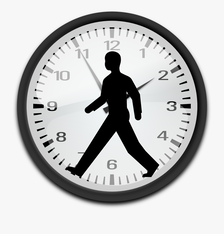 Time is another major resource. None of this stuff will do itself. Yes, I know, you’re a writer. You don’t want to have to spend all your time doing marketing. Which makes it all the more important that you don’t waste what time you are willing to expend on marketing, doing the wrong things. There is an old saying in quality management “Isn’t it amazing how people who don’t have time to get things right the first time they do them, always have plenty of time to correct their mistakes.” And if you are spending money, you can’t afford to spend even more money correcting mistakes by getting things wrong first time. So, all that research is critical to you avoiding getting things wrong the first time you try them.  The final resource I’m going to talk about is knowledge, which I have already touched on earlier. If you don’t really know what you are doing, you are going to waste your other resources on getting things wrong. “Trial and error” may teach you a lot, but it is an expensive way to learn. Invest in yourself, even if the investment is just time spent doing a free on-line course. We’re not talking about studying for a 3 year business management degree here, just a few hours learning the basics of social media marketing and trying out a few ideas to get a feel for what is right for you and your books. And once you have your marketing plan – you can use it again and again, refining it each time as you learn what works best and what isn’t working so well. Because you will have to keep repeating your marketing activity, because marketing messages soon fade from people’s consciences and you will always be looking for new readers who will buy your books, because nobody buys the same book a second time (except as a gift for someone else or because they forgot they owned it already). * We know that Twitter now accepts posts of up to 280 characters, but you need to make an allowance for the inclusion of a link to the book’s sales page and for hashtags. And, of course, character count isn’t an issue for Facebook posts, though people rarely read beyond the first few lines. For Facebook, think “elevator pitch”. If you have enjoyed this blog, or found it informative, make sure you don't miss future editions by signing up for our newsletter. We'll even give you a FREE ebook if you do.  All Indie authors need an advertising budget. There, I’ve said it. You may not want to read that and you may now be sticking your fingers in your ears and going “la la la”, but I’m afraid it’s true. Let’s start from basics. Nobody is going to stumble on your book by accident. It may be the best book ever written, but if nobody knows it exists then they can’t read it. 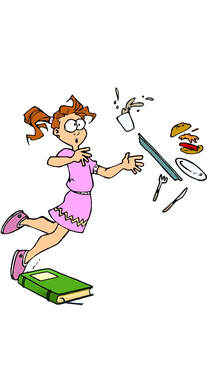 Nobody is going to stumble on your book by accident! Nobody is going to stumble on your book by accident! You will be aware that social media can be used to bring your book to the attention of a wider audience for free, but it has a limited utility. Once your post or Tweet about your book has been read by your “friends” or “followers” they will do one of two things. They will either buy the book (hooray) or they will ignore it (boo). After that, no matter how often you post or Tweet about your book, nothing will happen. The people who bought your book when they first saw the post aren’t going to buy it again and the people who ignored it first time around are going to continue to ignore it. This means you have to keep finding new “friends” and/or “followers” who haven’t previously seen your message and who will either buy your book or ignore it. And finding those people is a relentless slog which takes up more and more of your time. And your time is valuable. You should be spending your time writing new books, not trawling through social media trying to attract new people.  Which is where advertising comes in. There is a thing in commerce called “spend to save”. The basic principle is that if you spend money now on certain things, you will save money in the longer term. For example, if you spend £1,000 on replacing your existing light bulbs with more energy efficient light bulbs, you will save more than £1,000 over the next five years, thus repaying the initial outlay and making a profit. This is also known as “return on investment” (ROI). The same principle applies in advertising, though here you might call it “spend to earn”. If you spend £x on advertising now, you will earn £y back in sales, so the advertising cost is paid back and you get your ROI. This is something that is well understood across business. If advertising didn’t pay for itself, then all those adverts that we see on-line, on TV, in the cinema and that we hear on the radio, just wouldn’t be there. Advertising has to pay for itself or or nobody would do it.  But you are an Indie author. You don’t have much money. How can you possibly afford to advertise? Fortunately, the same social media we used to promote our book for free, also offers the facility to advertise that isn’t expensive. You may have 5,000 followers on Twitter, but a paid advertisement has the potential to reach millions of people. The same applies to Facebook and to all the other forms of social media. It even works by paying for advertising on Amazon. There are some good practices that should be born in mind if you are going to advertise and I’ll touch on these now. We have covered most of them in previous blogs, so we won’t go into detail here. 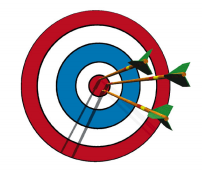 Target your audience. Make sure the advert is aimed at the right people. There’s no point in paying for your book to be promoted to people who don’t read books or who don’t read books in your genre. Time your advertising. Not everyone is on social media 24/7, so find out when your audience is likely to be on-line and time your advertising accordingly. Change your message. People get annoyed by repetition, so each advert should be different from the one before. This will require you to be creative – but you’re an author, you are already creative. Make your adverts eye-catching. People are more attracted to pictures than to words and they are more attracted to moving pictures than to still ones.  Think long-term. Every new reader that you attract with an advert is likely to stay loyal if they enjoy your book. So that’s a sale in the bag for your next book and all the others you are going to write – and you won’t have to pay for those sales. Save to spend. Set aside money from each sale to help pay for your next advert. I would recommend 10% minimum from the income from each sale.  You shouldn’t waste money on those businesses (mainly on Twitter) who offer to promote your book to their gazillion followers. Their output isn’t targeted and there is very little evidence that it produces results. You might as well stand in the street with a megaphone shouting “buy my book”. In fact, you’d probably get more sales that way (along with a restraining order). How much should you spend? Well, a Facebook advert running for 4 days will cost about £25 ($30) and that should return you enough sales to justify the cost. Other social media channels and Amazon offer similar levels of pricing. How often should you advertise? As often as you can afford it. I would suggest at least one advert per month and if you can’t afford that, try for one very two months. Have I convinced you? If not, then there is only one thing that will. Give it a try, just once, and see what happens. Experience costs money, but for some people it is the only way they will be convinced. But, let’s face it, if your book isn’t selling, then doing nothing isn’t really an option if you want that to change. If you have enjoyed this blog or found it interesting, make sure you don't miss the next edition by signing up for our newsletter. If you do, you can get a full length novel for FREE. Just hit the button.  In an earlier blog, a book review as it happens, I mentioned that I created a mental image of the sort of people that I think buy my books. It helps me if I have them in mind when I’m writing, because I can tailor my writing style to them. There is nothing new in taking this sort of approach. In marketing terms, it is P for people, which means understanding the sort of people who are going to buy a product. If you are creating fashions that appeal to women in their late teens to early twenties, for example, it is important to know what sort of styles, colours and fabrics those consumers are attracted to. It will be totally different to those that appeal to women in their 50s and 60s. Get it right and you sell lots of product, get it wrong and you are left with thousands of items unsold – and a reputation for being a brand that is out of touch.  Know your audience! Know your audience! I could give loads of examples of how manufacturers adopt this approach, but I would quickly bore you and I have no desire to do that. But market research plays a huge part in developing a product, just to find out what the buying public finds attractive and what they don’t. Pretty much every product has its “ideal” consumer. And, at the most basic level, a book is just another product, so knowing your audience, or consumer, is important to authors for the same reason. If you use a lot of modern slang in your writing, you are not going to write a book that appeals to readers for whom such slang is as alien as a foreign language. But there is more to it than that.  Sci-fi audience Sci-fi audience Certain types of fiction attract different types of reader. Research was carried out into readers of sci-fi and fantasy, collectively known as SFF. It was discovered that there is a strong correlation between people who take an interest in science and those who read SFF. The findings report that SFF readers start at a young age, typically under 20. They read more than the average number of books per month. Boys have a higher preference for sci-fi and girls have a preference for fantasy, though both are likely to read either. And perhaps most importantly, the study found that SFF readers have a higher level of educational achievement compared to other reading genres. The most important take-away from that is educated readers usually have more sophisticated tastes. They won’t put up with poor quality writing. So, if you are an author who writes in either of those genres, expect your readers to be well educated. They will have a good understanding of science and, for fantasy, they will probably have a good working knowledge of mythology, demonology etc "There are obvious age divides in some markets." If you forget that, you might find your books don’t attract readers and you may also find that those that do sell don’t get good reviews. Are you an SFF author? Did you know that? There are differences in other genres as well. Unsurprisingly, women are bigger readers of romance, but they are also bigger readers of thrillers, which came as a bit of a surprise to this author. Also, thriller and crime readers tend towards the older generations, with 35% being over 65, but less than 5% being under 30. So, in terms of the language used in thrillers and crime novels, it is best to stay away from modern idioms and slang if you want to reach the largest audience. There are obvious age divides in some markets. “Young adult” is such a market. Those readers will be well versed in modern slang. So much so that in three year’s time, a whole new audience will have emerged who can’t relate to the language that was used just a few years earlier.  Age gap Age gap This means that YA fiction dates very quickly, unless the author is very careful in their choice of language. It has to be “young” enough to appeal to that age group, but also won’t go out of date too quickly and result in poor sales in a few years’ time. YA readers outgrow the genre quite quickly, looking for new authors that appeal to their developing maturity, so there is no longevity, the way there is in other genres. Capture the attention of a thriller reader at 30 and you pretty much have their attention for the rest of their life. Capture a YA reader at 13 and you’ve probably lost them by 18. So, the YA author has to keep looking for the next audience, not just for their new books, but also for their existing books. Personally, I would avoid writing YA for that very reason, because the marketing effort is never ending. It also means that output has to be higher to satisfy the existing audience before they outgrow the genre. 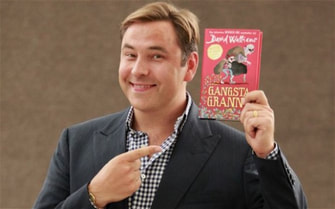 Children's author David Walliams Children's author David Walliams This same problem also applies to writers of children’s books. If Mum or Dad were fans 15 to 20 years earlier, then they may buy the books for their children, but otherwise the author has to rely on a lot of peer influence to make their books popular. My grandson reads the books his school friends read, not the ones his parents want him to read. For example, The Chronicles of Narnia collection, by C S Lewis, rank only 5,600 on Amazon, but the latest David Walliams book is ranked at 13. In 20 years time you can say “David Walliams” and the children won’t reply “Yeah, I read his books”, as they do now, they’ll reply “Who?”. The author of the books they will be reading is probably still at school him or her self right now. So, who is your generic reader? Are they male, female or both? What age are they? What sort of educational levels have they achieved, or will they achieve? What are their hobbies and interests? What language will they relate to and what will make them throw your book at the wall? It isn’t always easy to answer those sorts of questions, but you can start close to home. Do you write the sorts of books that you also like to read? If so, then you probably conform to the norm for your genre except for, perhaps, gender. Just because you are male (or female) it doesn’t mean that only men (or women) will like your books, because some genres have cross gender appeal. Others, however, don’t. 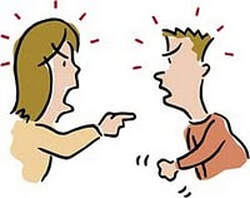 Some men won’t buy books with a female protagonist and some women won’t buy books with a male protagonist, because they can’t identify with them. Others have no problem with either. And if there are gender issues that limit your audience size, then you can bet your life that there are also further limiting factors, such as sexual preferences. Will a book with strong LGBTQ+ content have a wide appeal amongst heterosexual audiences? It's more like to be read by a niche audience and niche markets are unlikely to result in fame and fortune (if those are your goals). Ultimately this is important not just in terms of who will buy your books, but also how you market your work. There is no point in directing your limited advertising budget towards the wrong audience, or one that is heavily biased in terms of gender, age, educational achievement or any other characteristic. It also matters when it comes to where you promote your work. If you are a writer of children's books or YA, don't bother with Twitter or Facebook, because your readers are all on Tik-Tok. As for the older generations, the older they are, the less likely they are to be on social media in the first place. Reader loyalty doesn’t come about by accident. It comes about because you understand your readers and your readers understand your books. If you have enjoyed this blog and want to be sure of not missing the next one, just sign-up for our newsletter by clicking on the button below and you will also qualify for a FREE eBook..  Internet trolls! They get everywhere these days. They’re mainly to be found on social media sites such as Facebook and Twitter, but they can turn up anywhere. You’ll find them in the reviews section of Amazon and other retail sites (the 1 star end of the scale, naturally). They also appear on Goodreads and similar sites. It wouldn’t surprise me if a couple turned up in the comments section of this blog because, let’s face it, they’re not going to like what I have to say about them. I’m not sure if trolls attack authors any more than they attack anyone else, but let’s face it, if you are trying to do something worthwhile, someone will always try to bring you down, which is pretty much the job description of a troll. Some of them may not even think of themselves as being trolls. They just think they're "telling it like it is" (or similar euphemisms to justify obnoxious behaviour) It's easy to say “block them and move on”, but the hurt has already been felt the moment the words are read. And that’s what the trolls know. You can’t un-see and you can’t un-feel. It can leave you feeling low for the rest of the day and even longer. It can make you want to hurt them back, even though you are a nice person who wouldn’t otherwise dream of hurting anyone. It can even make you want to hurt yourself.  It would be nice if the social media platforms et al were to do something about them, but trolls are customers too, so they don’t take action. Not that the trolls spend any money, but the platforms do receive income from any ‘clicks’ they might make on adverts during their daily round of trolling. That was how I experienced my most recent interaction with a troll. I was doing an on-line book promotion for one of our authors, offering a free download of one of his books. I paid a certain social media giant to get that message in front of ‘interested’ users of the platform and, a few days into the promo I received a comment saying “You can’t reduce the price low enough for me to buy this book.” Not the greatest insult in the world, I grant you. Oscar Wilde, if he were still alive, would have no worries about that person stealing his laurels, but it didn’t stop it being a little bit hurtful for the author. "Yes, I actually paid to be trolled." The thing is, because the troll had responded to the advert, I had to pay the social media company. Yes, I actually paid to be trolled. So, I blocked him and moved on. Only I didn’t, did I? Because if I had, you wouldn’t be reading this blog. There are a couple of things we can guess about the person who made the comment. The first things is that he (they are predominantly male) hadn’t actually read any of our books. The second is that they probably don’t read books in the first place. Books enlighten and trolling is a product of ignorance. So, what motivates trolls? "So why do they do it?" It would be easy to dismiss their behaviour as the modern equivalent of the school bully. They do it because they can. But that shows a lack of understanding of bullies. Bullies do what they do not just because they can, but because it demonstrates their power over their victims, especially to those people that hang around bullies, desperate not to become victims themselves. Trolls don’t have hangers on like that, so what they do doesn’t demonstrate their power to anyone. Even those people who actually see the insult on social media won’t know the true identity of the person who posted it. So why do they do it? The real reasons are different and they are several. Trolls don’t all do it for the same reason. Dr Mark Griffiths, Professor of Behavioural Addiction at Nottingham Trent University, gave four reasons: revenge, for attention, out of boredom and for personal amusement. Yes, they find it funny, even if no one else does.  I wouldn’t want to disagree with Dr Griffiths (but you know I’m going to) but I think it runs deeper. I think that the lives of most trolls are so empty and unfulfilled that they can’t stand to see anyone who is living a happy, fulfilled life, so they try to bring them down in the only way available to them. They are similar to the vandals who trash parks, gardens and beauty spots. Their own lives are so bleak and lacking beauty that they can’t stand to see beauty anywhere else. So, you are a happy fulfilled person, expressing your views on Twitter or Facebook, celebrating your successes, bemoaning your minor failures or promoting your work. And they can’t stand your sense of wellbeing, your apparent success, the fact that your problems are quite small compared to theirs and that you are actually achieving things through your work. They can’t stand the fact that you are doing something worthwhile. So they set out to damage that sense of wellbeing. Well, what about the people who are suffering larger problems, like mental health issues, illness or bereavement? They get trolled too. "It gives them an even greater thrill." . Yes they do, but for much the same reason. It’s not enough for the troll that you are feeling low because of whatever is happening in your life. No, that just makes you a soft target. They can make you feel even worse, which is what they want to do. It is a form of sadism. It gives them an even greater thrill. Of course, they have nothing to feel good about. Their lives are still as vacuous as they were before. Their existence is still as pointless. If they are lonely, they will still be lonely. If they are poor and/or unemployed, they will still be poor and/or unemployed. If they can’t form proper relationships, they will still be unable to do so. If their boss is always on their back at work, their boss will still be on their back at work. But for a fleeting few seconds after they hit the key to post their nasty little insult, they feel powerful. In that instant they no longer feel like the losers that they really are. Of course, it doesn’t last. As I said earlier, there is no one there to see their power, so they can’t bask in the fake adoration of their minions. The feeling is so fleeting that they have to start looking for a new target almost immediately. Which is why most trolls spend so much time on-line in the first place. They are addicted to that fleeting moment of pleasure, because they can’t get it anywhere else.  OK, understanding what makes a troll tick doesn’t do anything to get rid of them. Is there actually anything you can do? The first and most important thing is DO NOT INTERACT. If you respond in any way they will know they got to you and that increases their feeling of pleasure. Even if they have sent you into floods of tears, they mustn’t know that they have had any effect on you at all. Report their behaviour. In the short term not much will happen, but if enough people report them, they will be banned from the site. Their IP address will be blocked, which means they won’t be able to re-register under another name unless they do so from a different IP address. Eventually they’ll run out of tech they can use and will have to resort to internet cafes, which cost money. The next thing you must do is block them (if the site has that facility). If not, use whatever contact facilities are available to you to get the troll blocked. On most platforms they won’t even know you have blocked them, but at least it’s one less troll for you to worry about (until they open a new account with a new username). If enough people block them, it will help the site to decide if they should be banned. 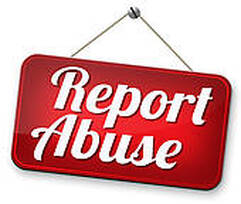 Don’t post on-line that you have been targeted. There’s a good chance that the troll will see your post through the feeds of other people, especially when some people share so indiscriminately. It also encourages other trolls that may see your post. You will be helping them to identify you as a ‘victim’ and trolls love victims. Nothing is private on the internet. You have to assume that your post will be seen by trolls as well as by nice people. If the abuse is really bad, especially if it is racist, homophobic, transphobic, misogynistic or similarly harmful, report it to the police and contact the platform owners using a more direct route than the simple reporting tools that are available. Somewhere there will be a corporate email address or phone number you can use – so use it. Make sure that they understand the emotional impact the trolling is having on you. Make them take responsibility for the bad behaviour of the users of their site. "But we all need to think about our own behaviour" Now all I can do is wish you a happy and a troll free week. But we all need to think about our own behaviour, too. Any of us could be considered to be a troll simply because of the language we use. There is a simple rule to follow: ask yourself if you would say it to someone’s face. If the answer is ‘no’, then its best not to say it at all. Or rephrase it in a way that would allow you to say it to their face. Other than trolls, hardly anyone ever sets out to be offensive, but it’s very easy to cause offence by accident. If you have enjoyed this blog or if you have found it informative, be sure not to miss any future posts by subscribing to our newsletter. Just click on the button below. We promise not to spam you (or troll you). |
AuthorThis blog is compiled and curated by the Selfishgenie publishing team. Archives
June 2025
|
 RSS Feed
RSS Feed